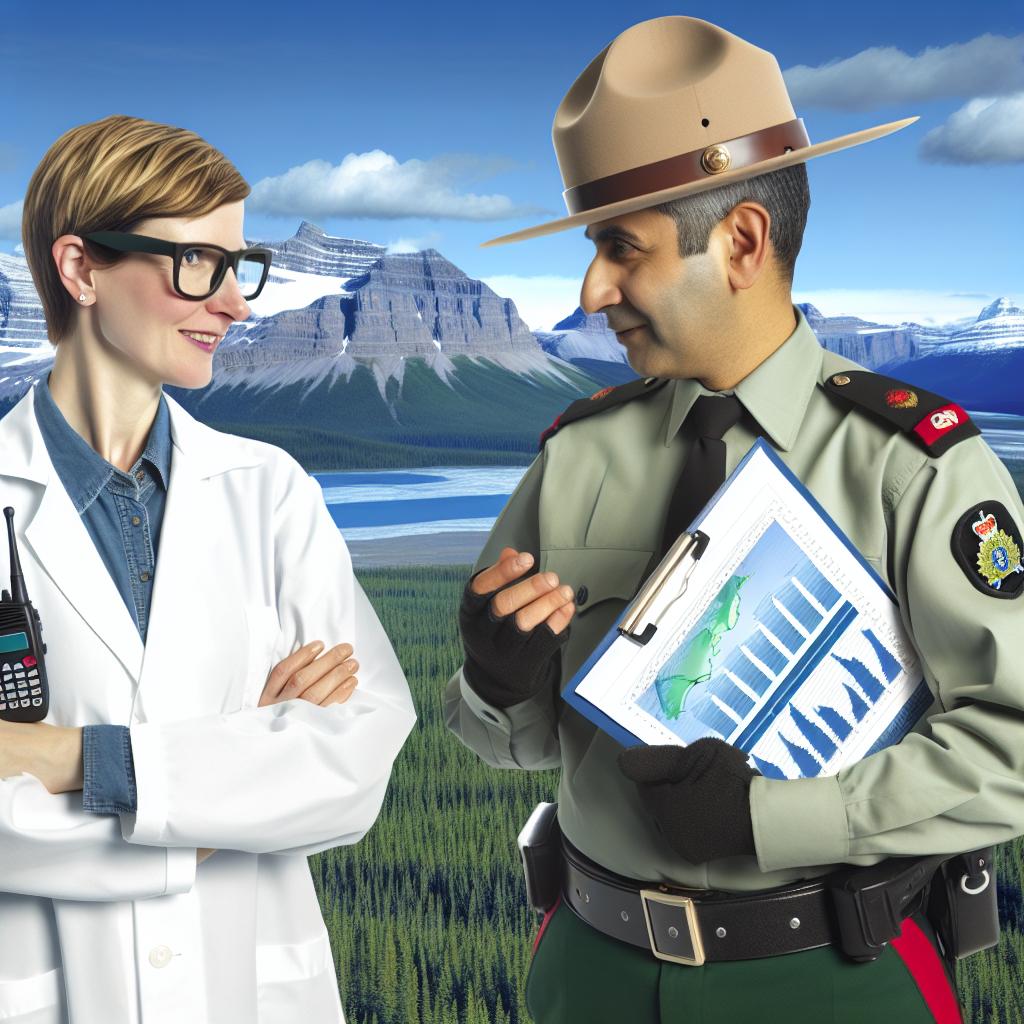Defining Environmental Scientists: Roles and Responsibilities
Overview of Environmental Science
Environmental scientists study interactions between humans and the environment.
They analyze data to understand environmental issues more effectively.
Moreover, they develop solutions to complex environmental challenges.
Key Responsibilities
- Environmental scientists conduct field research to gather data.
- They perform laboratory experiments to test hypotheses.
- Additionally, they analyze results and prepare detailed reports.
- They often collaborate with other scientists and stakeholders.
Areas of Expertise
Environmental scientists specialize in various fields.
For instance, some focus on air quality and pollution control.
Others may concentrate on water resources and ecosystem health.
Climate change research is another critical area of expertise.
Practical Applications
Environmental scientists inform policy decisions through their research.
They provide data to help organizations meet regulatory standards.
Additionally, they play a role in developing sustainable practices.
Defining Environmental Officers: Roles and Responsibilities
Overview of Environmental Officers
Environmental officers play a crucial role in managing environmental policies.
They help ensure compliance with environmental laws and regulations.
In addition, they work with various stakeholders to promote sustainability.
Key Responsibilities
Environmental officers oversee environmental audits and assessments.
They develop and implement management plans for natural resources.
Moreover, they monitor environmental impacts from industrial operations.
They also conduct public awareness campaigns on environmental issues.
Collaboration and Consultation
Collaboration with government, industry, and community groups is essential.
Environmental officers consult with scientists to interpret data effectively.
Their role often includes training staff on environmental best practices.
Regulatory Compliance
Environmental officers ensure that organizations follow environmental laws.
They prepare reports for government agencies and stakeholders.
This includes submitting plans for waste management and pollution control.
Fieldwork and Research
Fieldwork is a significant part of an environmental officer’s job.
They frequently gather samples and perform site inspections.
Unlock Your Career Potential
Visualize a clear path to success with our tailored Career Consulting service. Personalized insights in just 1-3 days.
Get StartedAdditionally, they analyze environmental data for reporting purposes.
Impact Assessment
Environmental officers conduct Environmental Impact Assessments (EIAs).
These assessments evaluate the potential effects of new projects.
They advise on mitigating strategies to minimize negative impacts.
Educational Requirements for Environmental Scientists vs. Officers
Education Pathways for Environmental Scientists
Environmental scientists typically hold a bachelor’s degree in environmental science or a related field.
Many pursue advanced degrees in specialized areas such as ecology or soil science.
These degrees often include extensive fieldwork and laboratory experience.
Students learn to assess environmental impacts and develop sustainability practices.
Additionally, coursework may cover topics like climate change and resource management.
Qualifications for Environmental Officers
Environmental officers generally need a bachelor’s degree in environmental policy or law.
Some positions require additional certifications or training in environmental regulations.
Officers often benefit from legal expertise related to environmental legislation.
Training focuses on compliance, enforcement, and risk assessment procedures.
Furthermore, internships or volunteer experiences can enhance job prospects.
Comparison of Educational Emphases and Job Focus
Environmental scientists prioritize scientific research and data analysis skills.
In contrast, environmental officers emphasize policy implementation and legal compliance.
Both roles may require strong analytical and communication skills.
However, their educational focuses significantly influence their job responsibilities.
Understanding these differences helps aspiring professionals choose their path.
Find Out More: Importance of Environmental Officers in Sustainable Development
Key Skill Sets: Comparing Scientists and Officers
Core Responsibilities
Environmental scientists focus on research and data collection.
They analyze ecosystems and assess environmental impact.
On the other hand, environmental officers enforce regulations.
They ensure compliance with environmental laws and policies.
Both roles contribute significantly to environmental management.
Educational Background
Most environmental scientists have advanced degrees in science.
Common fields of study include biology, chemistry, and ecology.
Alternatively, many environmental officers hold degrees in law or public policy.
A good understanding of regulations is crucial for their role.
Technical Skills
Environmental scientists are skilled in scientific methodologies.
They use specialized tools for data collection and analysis.
Conversely, environmental officers need strong communication skills.
They often work with stakeholders to implement policies.
Analytical Skills
Analytical skills are vital for both positions.
Environmental scientists assess scientific data rigorously.
Meanwhile, environmental officers analyze compliance issues strategically.
They seek effective solutions to environmental challenges.
Field Experience
Fieldwork is crucial for environmental scientists.
They often conduct experiments and collect samples in nature.
Environmental officers, however, may work in offices and communities.
They conduct inspections and engage with local stakeholders.
Communication Skills
Clear communication is essential for both roles.
Scientists must present their findings to diverse audiences.
Environmental officers must convey complex regulations simply.
Both professionals facilitate community understanding of environmental issues.
Delve into the Subject: The Role of Correctional Officers in Public Safety
Areas of Specialization
Role of Environmental Scientists
Environmental scientists focus on studying the environment.
They analyze data and conduct research on ecological issues.
Also, they assess the impact of human activities on natural systems.
Moreover, they develop strategies for environmental protection.
In addition, they often work with government agencies and NGOs.
Role of Environmental Officers
Environmental officers enforce environmental laws and regulations.
They ensure compliance with environmental policies in various organizations.
Also, they conduct inspections to monitor environmental practices.
Additionally, they investigate violations of environmental regulations.
They collaborate with businesses to promote sustainability initiatives.
Areas of Expertise
Environmental scientists specialize in various scientific disciplines.
Their expertise may include biology, chemistry, or geology.
Conversely, environmental officers focus on legal and regulatory frameworks.
They typically have knowledge of environmental law and compliance procedures.
Thus, their skill sets differ significantly in application and focus.
Approach to Problem-Solving
Environmental scientists often use a research-based approach.
They employ scientific methods to gather and analyze data.
On the other hand, environmental officers use a practical approach.
They implement regulations and ensure organizational compliance.
This results in different methodologies for addressing environmental issues.
Types of Employment
Environmental scientists typically work in academia or research institutions.
They may also be employed by government agencies or consulting firms.
Environmental officers often work within governmental agencies.
Additionally, they find positions within corporations and nonprofits.
Thus, each group occupies distinct sectors of the workforce.
See Related Content: Work Environment of Correctional Officers in Canadian Prisons

Work Environments: Fieldwork vs. Office Settings
Fieldwork for Environmental Scientists
Environmental scientists often conduct research in various outdoor locations.
They gather data directly from ecosystems.
They collect samples from water bodies and air quality sites.
This hands-on approach allows them to assess environmental conditions firsthand.
Fieldwork can involve hiking and camping.
Scientists also work in remote areas.
Moreover, scientists often collaborate with other professionals in the field.
Field studies can be physically demanding.
They also depend heavily on weather conditions.
Consequently, environmental scientists must prepare for various conditions.
They utilize specialized equipment for sampling.
They also use monitoring tools during fieldwork.
Overall, fieldwork fosters a direct connection with nature and ecosystems.
Office Settings for Environmental Officers
Environmental officers typically work in office environments.
They focus on policy development and regulatory compliance.
This role often involves drafting reports.
It also includes analyzing data related to the environment.
Officers review environmental regulations to ensure compliance.
They spend time coordinating with government agencies.
They also collaborate with various stakeholders.
In addition, officers engage in community outreach and education.
Office work involves less physical activity than fieldwork.
However, it requires strong analytical skills.
It also demands excellent communication abilities.
Furthermore, officers often use technology for data management.
Comparing Fieldwork and Office Settings
Fieldwork provides hands-on experience.
It also presents dynamic challenges.
On the other hand, office settings offer stability.
They focus more on data analysis and policy work.
Both environments contribute significantly to environmental science.
Scientists gain practical knowledge outdoors.
Officers protect the environment through policy.
Both roles play crucial parts in environmental stewardship.
Uncover the Details: Canadian Industries Hiring Environmental Officers Today
Impact on Policy
The Scientist’s Role in Research
Environmental scientists conduct rigorous research to understand ecological issues.
They collect data on climate change, pollution, and biodiversity loss.
Through experiments and field studies, they develop theories and models.
Their findings often influence public awareness and scientific understanding.
Moreover, they publish their research in scientific journals for broader dissemination.
This enhances the credibility of environmental data and issues.
Ultimately, their work lays the groundwork for informed policy decisions.
The Officer’s Role in Implementation
Environmental officers translate research findings into actionable policy.
They work within government agencies to enforce environmental regulations.
Additionally, they oversee compliance with local and national laws.
They engage with communities to raise awareness about their environmental responsibilities.
Furthermore, officers collaborate with scientists to design effective programs.
These programs aim to mitigate environmental harm and promote sustainability.
In this way, they ensure that scientific knowledge impacts real-world actions.
Collaboration Between Scientists and Officers
Successful environmental policy depends on collaboration between both roles.
Scientists provide evidence-based recommendations for officers to implement.
In turn, officers relay practical feedback from the ground back to scientists.
This feedback loop enhances the effectiveness of policies.
Both roles complement each other to achieve common environmental goals.
Together, they facilitate a holistic approach to addressing environmental challenges.
Career Paths
Job Opportunities for Environmental Scientists
Environmental scientists have diverse job opportunities in various sectors.
Common employers include government agencies, private firms, and non-profit organizations.
Many scientists work in research.
They conduct studies on environmental issues.
Others may focus on policy development and analysis.
Environmental consultants often help businesses comply with regulations.
Some scientists may work in academia.
They teach and mentor students.
The scope of employment continues to grow as awareness increases.
Advancement for Environmental Scientists
Advancement for environmental scientists often depends on experience and education.
Entry-level positions typically require a bachelor's degree in a related field.
Advanced roles usually require a master's or doctorate.
Certifications can enhance job prospects and credibility.
Networking plays a significant role in career advancement.
Job Opportunities for Environmental Officers
Environmental officers also have numerous career options available.
They work primarily within government agencies and regulatory bodies.
Private companies hire officers to ensure compliance with environmental laws.
Some professionals engage in enforcement and environmental education.
Opportunities exist in international organizations focusing on environmental protection.
Career Advancement for Environmental Officers
Career advancement for environmental officers often comes from gaining qualifications.
Many enter the field with a bachelor's degree in environmental science or law.
Progression typically requires hands-on experience in environmental management.
Specialized training in policy or compliance enhances career prospects.
Leadership roles can arise through demonstrating effective project management skills.
Participation in professional organizations can also facilitate advancement.
Additional Resources
Political Appointee Tracker • Partnership for Public Service




